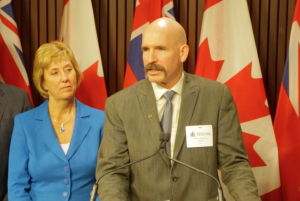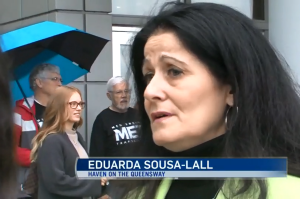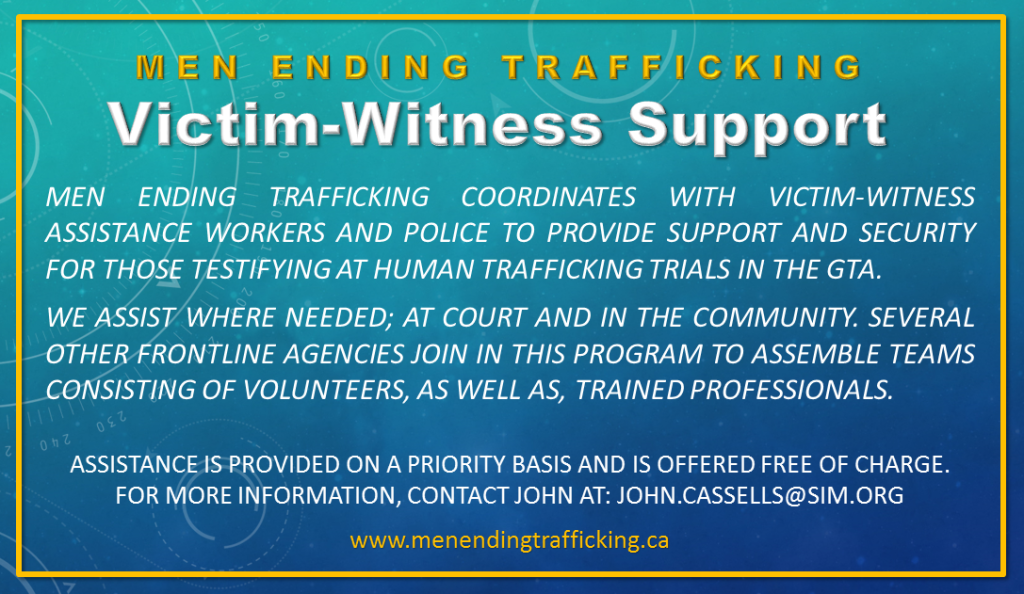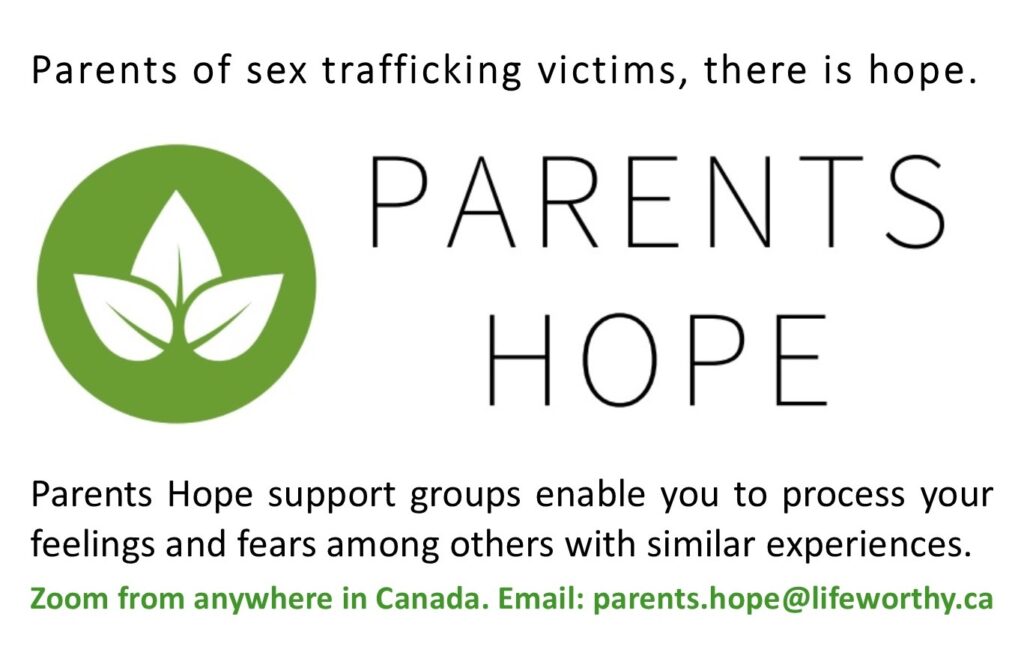
From communities across Canada, untold numbers of young women* are involved in escorting, street walking, exotic massage, stripping and pornography. These common activities of the domestic sex industry strip away “human dignity” and have a “disproportionate impact on women and children”.** Despite the resulting extreme emotional and physical toll, many young women will remain in the industry for a very long time. It can be truly devastating for family and friends to watch this happen, and it can also be confusing to understand why the girls don’t just come home. In the end, most make it out alive, but none remain unscathed. The damage inflicted can be severe.
In this age of the “hook-up culture“, many young people have adopted a casual view of commercial sex. As a result, more kids from functional homes are participating in sex industry activities, than ever before. While there may be a lack of obvious precursors for some, it’s important to note the likelihood of involvement exponentially increases when additional factors are present. Understanding the roots of vulnerability is invaluable, whether safeguarding young people from exploitation or helping them escape it. Ethnicity, socioeconomic status and neighbourhood demographics do have some bearing, but the following risk indicators are applicable to young people from any community:
- Female adolescent
- Absent or inattentive father
- Neglect or parental dysfunction
- Parental substance abuse/addictions
- Abuse: emotional, physical or sexual.
- Depression or other mental health issues
- Social difficulties/lack of stable peer relationships
- Developmental challenges
- Use of drugs/alcohol by the young person
- Estrangement from family, including homelessness and foster care
Young men are also commercially sexually exploited, but less frequently. Their experiences are not the same. To begin with, physical differences render the girls more vulnerable to the violence that so often occurs. But male minds may also serve as a defense. Young men do not experience the same loss of self-determination as their female counterparts, and will more easily remove themselves from sex industry activities when they feel it is time to do so.
Many young women entering the sex industry are introduced to it by traffickers who use coercion to exploit them for their own gain. Others may enter without that level of duress, but once a female is exposed to the sex industry, she faces an exponentially greater risk of human trafficking. While pimps often pose as “boyfriends” or “agents”, most are, in fact, human traffickers.
Traffickers exploit their victims for the profits, and sometimes, to gain notoriety amongst their peers. In contrast, the reasons girls enter and stay in the sex industry are much more numerous and complex. Below is a list of 20 common reasons why girls go into the sex industry and/or don’t come home. All 20 may not apply to any one person, but at least a few probably will. Every point on the list is a common tactic used by pimps to lure or trap their prey, and each point is marked with a HTV, indicating that it relates to HUMAN TRAFFICKING VICTIMS.
Half of the list also applies to girls who may not be human trafficking victims, but are ensnared nonetheless. Entering the sex industry may be the result of a last-resort decision in a desperate situation, or a response to its enticement by a young person feeling lost. Even for girls without a pimp, exiting can be a great challenge. Points that are applicable to those WITH OUT A PIMP are marked with WOP.

Fast Money: HTV WOP A great deal of money can be made quickly in the sex industry. Young women may be motivated by pressing financial needs, or simply be drawn by its seductive lure. Once a girl is entrenched in the sex industry, low paying jobs seem untenable. The draw of fast money can remain with her even when her pimp takes the money away as fast as she brings it in.
Glamour: HTV WOP For someone entering the sex industry, fancy clothes, expensive gifts and fast cars create a convincing illusion of a glamourous lifestyle. This can more powerfully affect those from low income homes.
Intrigue: HTV WOP The sex industry is often fast paced and unpredictable. Those involved may frequently experience an adrenalin rush. This tends to be habit forming, with the desire to repeat the behaviour. As drama and danger become part of their normal world, peace and quiet may become boring or uncomfortable.
Validation: HTV WOP Girls who are starved for validation, especially from fathers, may feel an emotional need is being met through sex industry activities. Although the men they will encounter are self-serving, their brief attention may feel comforting. For some, this is a primary reason to remain in the sex trade.
Counterfeit Love: HTV The most common approach utilized by Canadian traffickers is the illusion of love. Attention, affection and gifts are all part of the ploy. Trapped girls often view their trafficker as a boyfriend, long before they realize he is their pimp.
False Promises: HTV Traffickers commonly motivate girls with promises that can be as simple as a gift or special treatment; or it can be a tale about a happy future that doesn’t involve “working”. Younger girls and those with developmental challenges are especially vulnerable to such tactics by the pimp.
Brainwashing: HTV Traffickers often manipulate or force their victims to reject family, and to distrust police and social workers. Typically, a pimp will frequently tell his girls they are inadequate of without him.
Isolation: HTV A trafficker usually restricts contact between his victim and their family members, friends or others who might advocate for them. The trafficker may also move her from place to place to keep her detached and to prevent her from making new connections with others. This enforced isolation makes it easier for the trafficker to control his victim.
Drugs and Alcohol: HTV WOP Use of drugs/alcohol was previously mentioned a risk factor because it puts young people in risky situations with diminished inhibitions and little ability to protect themselves from predators. But such behaviour can also lead to an addiction that drives the need to make “fast money”. Even for non-addicts, self-medication often becomes a means of coping, once in the sex industry. A trafficker may use drugs to increase a girl’s capacity for abuse (to be less resistant to client’s demands and/or to work longer hours) or to strengthen his control over her through dependency.
Accusations/Blame: HTV Traffickers constantly shift blame onto their victims. As a result, girls often blame themselves for what they have been involved in, regardless of their level of complicity.
Shame: HTV WOP Young women may feel great shame and guilt about their involvement in the sex industry. Traffickers leverage these emotions to strip away all confidence and self-respect from their victims. It becomes easy for them to believe that they are somehow lesser than others.
Violence/Torture: HTV Violence is occurs frequently in the sex industry. It may be used to physically overpower the victim or achieve submission by pain compliance and fear. When perpetrated by a client, the control is temporary, but traffickers may use violence to bolster a lengthy exploitative relationship.
Emotional Abuse: HTV WOP While emotional abuse might seem less violent than physical abuse, it can have an even deeper impact by eroding and ultimately breaking down the will of a victim. While more of a factor for trafficked girls, the impact of the emotional abuse inherent in the industry will also impact those without pimps.
Threats: HTV Traffickers often threaten their victims using a variety of techniques. Threats may range from physical violence to publically exposing the victim with pornographic images. When the threats directed at the victim become ineffective, a trafficker may threaten violence against her family members.
Trauma Bonds: HTV Victims often develop a sense of dependency on their abusers and develop a deep loyalty to them. This happens when extreme abuse and control is alternated with affection, praise, or simply providing the necessities of life. Pimps sometimes call this “dogging” a victim; psychologists describe the phenomena as “trauma bonds” or “Stockholm Syndrome”.
Debt Bondage: HTV Traffickers may demand repayment of supposed debts relating to living expenses, drugs/alcohol, purchased clothing/gifts or any number of things. Additionally, “leaving fees” are often levied for a victim who wants to sever ties with her trafficker.
Controlled Movements: HTV While it’s rare in the Canadian context, human trafficking victims can be kept in locked rooms and escorted anywhere they go. However, it’s quite common that the movements of a trafficked person will be closely monitored. Traffickers may not always be present, but they may use electronic devices or task one victim with watching another very closely
Normalization: HTV WOP Over time, this subculture will begin to seem normal. Whether or not they have been trafficked, young women inside the sex industry often become acclimatized to it. Obvious signs of that happening will be seen in the way they speak, and also their body language. They may view their experience as one of utter defeat, or they may think they are achieving significant success in this underworld. Either way, the “square world” (outside the sex industry) will quickly become a foreign culture where life is too cumbersome. Girls and women in this position may feel that exiting the sex industry is not worth the trouble.
Fear of Rejection: HTV WOP After becoming involved in the sex industry, many young women feel they are not “like other girls”, and that when people look at them, “they will know”. They believe that their reputation will always precede them and that rejection will be a major obstacle to rebuilding their lives.
Lack of Options: HTV WOP Young women wishing to leave the sex industry often believe nobody would want to give them a chance. They may not feel they can return to the home environments they left, it’s unlikely they have trusted friends who they can turn to for help, and they are probably unaware of community resources that are equipped to assist them in their transition out of the sex industry.
Girls who enter the sex industry may bear some measure of culpability in their own demise. But before we disown them, it’s important to examine the full picture and look at the possible reasons for their behaviour. By understanding why they entered the sex industry and what keeps them there, we can formulate a more effective response. The above list is meant to help give clarity to those seeking to help end the exploitation of a daughter, a friend, or a client. With the appropriate support, the possibility of exiting and recovery becomes much more realistic. While the past cannot be undone, there is always hope for future achievements. And there is great joy in seeing a young person experience healing, and embracing life as a survivor.
* Adolescent girls are most at risk for entry into the sex industry. With that in mind, I use the terms “girls” and “young women” throughout this document. This information is also very applicable to women, but may be less pertinent to preadolescent children.
** Taken from the preamble to Canada’s prostitution legislation, Protection of Communities and Exploited Persons Act, 2014.
Click for a printable copy of THE 20 Reasons.













